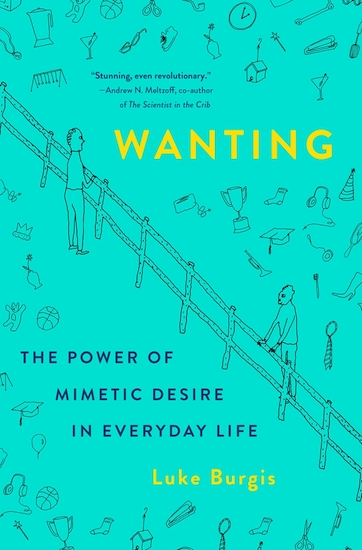Why do we want the things we want? While we’ll offer up plenty of reasons to explain our choices, my guest today says the real reason we want what we want is this: other people in our lives want those same things.
His name is Luke Burgis and he’s studied philosophy, theology, and classical literature, works as a business entrepreneur, investor, and educator, and is the author of Wanting: The Power of Mimetic Desire in Everyday Life. Luke and I discuss how our desires are strongly mimetic, that is, imitative, and how there are two groups of people that act as models of desire for us: celebrities and public figures who are distant from us, and friends, family, and colleagues who are close to us. Luke explains why it’s actually that latter group where we experience the most rivalry and conflict, because the more similar we are, the more we end up competing for the same things, the more envy we experience, and the more we want to differentiate ourselves from the crowd, even though the areas in which to do so can be increasingly small. In fact, someone can be a model of desire, not only in influencing us to imitate them, but in motivating us to act in the opposite way. Luke shares how mimetic desire can be both a negative and destructive or a positive and productive force, and offers advice on how to harness it for the latter purpose by humbly recognizing the way other people are influencing our wants, and using that knowledge to opt out of games we don’t want to play, utilize the healthy aspects of competition without allowing it to get us off track, and intentionally choose worthy, even transcendent, models of desire to emulate.
If reading this in an email, click the title of the post to listen to the show.
Show Highlights
What is mimetic theory? How great literature holds up a great mirror regarding human behaviorWhat great philosophers have discovered about imitation Celebristan, freshmanistan, and where our mimetic desires come fromWhen comparisons and rivalries impact the lives of people around us How does social media exacerbate mimetic rivalries?What’s a destructive mimetic cycle? What about a positive cycle?Zappos’ mimetic crisis, which led to their sale to Amazon (instead being successful on their own) The role of envy in mimetic desire Why being wealthy is different in 2021 than it was decades ago Is competition always a positive thing?What do you do, then, with this information about mimetic desire?Resources/Articles/People Mentioned in Podcast
Rene GirardWhat Do You Want to Want?Men and StatusThe Science of CompetitionCompetition: The Fuel for GreatnessThe Insidious Disguises of JealousyTony Hsieh’s Fatal NightNotes from Underground by DostoyevskyThe Autobiography of Gucci ManeThe Epic Story Behind the Lamborghini-Ferrari CompetitionConnect With Luke
Luke’s website
Luke on Twitter
Luke on Instagram
Listen to the Podcast! (And don’t forget to leave us a review!)





Listen to the episode on a separate page.
Download this episode.
Subscribe to the podcast in the media player of your choice.
Listen ad-free on Stitcher Premium; get a free month when

No comments:
Post a Comment